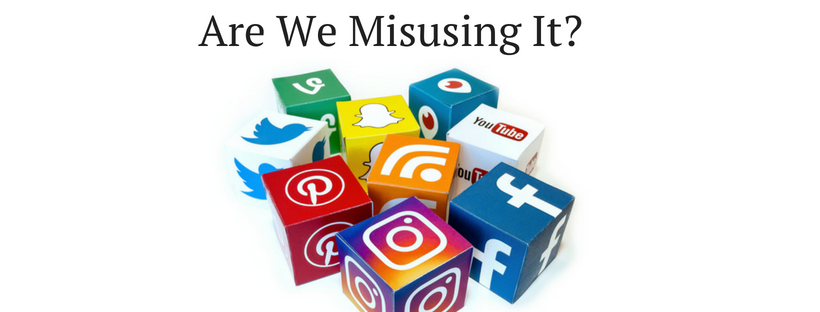It doesn’t take a statistician to tell you that social media use in India is a widely prevalent phenomenon. To give you a general idea, India has world’s
largest number of Facebook Users with over 195 million users, overtaking the US by over 4 million subscribers. The most popular social networks in India were YouTube and Facebook, followed by social app WhatsApp. In fact, Facebook is projected to reach close to 319 million users in in India by 2021!
Since approximately 17 percent of young adults in the country spend anywhere between between two to four hours on social media daily- if not more- it’s important to ask what impact is this having on their mental health. Ironically, Facebook themselves admit that excessive social media use can have an adverse impact on users mental health. In a blog post, Facebook researchers found that individuals who passively consume information on facebook, or mindlessly scroll through their feed report feeling unhappy after usage. Facebook hence suggests that actively interacting with people or sharing messages, posts and comments is connected to improvements in well-being.
Social media has several negative effects on a user’s mental health. These might include decreased self esteem, anxiety, depression, feelings of inadequacy and deterioration in concentration. It is also known to have a negative impact on our relationships.
Researchers in Austria discovered that people had a lower mood after just 20 minutes of facebook as compared to individuals who simply perused the internet. This is probably because Facebook usage has been seen as a waste of time. Negative interactions on social media also lead to depressive symptoms such as feelings of hopelessness and worthlessness. Social media also provoked symptoms of general anxiety disorder, including feelings of restlessness, worry and trouble sleeping. Reasons for this could be cyber bullying, believing that other people’s lives are perfect or better than our own and feeling like time spent on social media is a waste. People spending excessive time on social media often report feeling isolated and lack a sense of belonging.
Other effects of social media include feelings of inadequacy, with most people reporting that social media makes them feel unattractive, which might be indicative that it may be a cause for body image issues. Lately, psychologists say that excessive use of social media can lead to addiction, similar to an addiction to alcohol or cigarettes.
Clearly, there are several negative effects of social media. They occur as a result of upward social comparisons that we make while using it. Upward social comparisons occur when we compare ourselves to people who we consider superior to us. For example we may compare how we look to someone else’s selfie on Instagram and forget to account for the other facts or reasons that is making the person look so. These comparisons are what cause a decrease in self esteem which further serve to cause symptoms of anxiety and depression, amongst other unhealthy effects. We are presented with exaggerated and unrealistic versions of reality when scrolling through social feeds. Seeing perfection in body type, family composition, idealistic lifestyles and social preference, it’s extremely easy to feel inadequate about our own lives.
Research also indicates that being surrounded by artificial lighting all day and night can inhibit the body’s production of the hormone melatonin, resulting in a lack of sleep.
However, in certain cases, social media can improve user’s mental health and well-being. It can encourage people with mental illness to seek help, share information and join online support groups or forums. Lately, there is even a trend towards online therapy or counselling that can provide clients complete anonymity as well. Frequent social media use has been associated with improved ability to share and increased empathy.
Social media can also enhance mental health in other ways. Psychoeducation via social media platforms is increasing and people are now becoming aware about mental health and how to get help for it. It can also help reduce the stigma that one has about mental health issues and make people realise how it isn’t just ‘in your head’. TED talks and spoken word poetry are two platforms that have often spoken out about mental health awareness and can help people realise they are not alone. It can also help professionals spread awareness about mental health concerns by providing them a platform to interact with and learn from other professionals around the world.
Hence, to avoid all the unhealthy effects of social media, usage in moderate amounts clubbing them with the positives is recommended.
Authorship: Farah Maneckshaw, Intern at Synapsium
REFERENCES
101 Latest Social Media Facts and Stats from India – 2016 | Digital Marketing Facts. (2018). Retrieved from http://www.soravjain.com/social-media-facts-and-stats-india-2016
Brown, J. (2018). Is social media bad for you? The evidence and the unknowns. Retrieved from http://www.bbc.com/future/story/20180104-is-social-media-bad-for-you-the-evidence-and-the-unknowns
Dangers of Social Media on Your Mental Health. (2018). Retrieved from https://www2.viu.ca/humanresources/documents/DangersofSocialMediaonYourMentalHealthQ12017.pdf
millions), N. (2018). India: number of social network users 2022 | Statistic. Retrieved from https://www.statista.com/statistics/278407/number-of-social-network-users-in-india/

